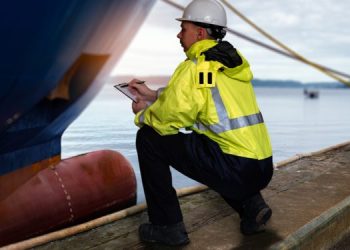Mitsubishi Shipbuilding held a keel laying ceremony marking the start of construction for a demonstration test ship for transport of liquefied carbon dioxide (LCO2), to be utilized in conjunction with initiatives by the New Energy and Industrial Technology Development Organization (NEDO) for its demonstration projects.
The Engineering Advancement Association of Japan (ENAA) will charter the ship from Sanyu Kisen, and install and operate the LCO2 marine tank system used to conduct research and development.
Three additional project partners, K LINE, Nippon Gas Line, and Ochanomizu University, will be commissioned by ENAA to conduct R&D on the pressure control and stability of the LCO2 transported on the ship, and plan demonstration experiments, as well as develop and demonstrate technologies for safe and low-cost CO2 transport.
Following launch, outfitting, and sea trials, the ship is scheduled to be handed over in the latter half of fiscal 2023 as an LCO2 carrier to facilitate carbon dioxide capture, utilization, and storage (CCUS).
Mitsubishi Shipbuilding will draw on its experience constructing this vessel to bolster its business for MHI Group’s energy transition strategy, and will develop the various technologies for LCO2 vessels necessary to establish a CCUS value chain.
For its part in this initiative, Mitsubishi Shipbuilding has laid out a vision for the decarbonization of the maritime economy through renewable energy and the carbon cycle, along with a safe and secure society through autonomy and electrification, and is working to generate new ideas in marine-related innovation and make them a reality.
As part of this effort, Mitsubishi Shipbuilding will actively pursue development and commercialization of LCO2 carriers, and as a marine systems integrator, aim to achieve decarbonization.





























































